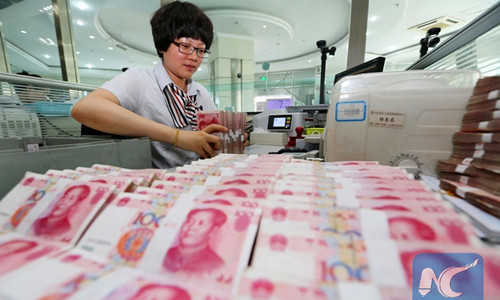HOME >> SOURCE
Pakistan widens use of yuan amid lower greenback supply
By Ma Jingjing Source:Global Times Published: 2019/12/25 21:13:40
Currency a new choice amid lower greenback supply

A worker counts Chinese currency Renminbi (RMB) at a bank in Lianyungang, east China's Jiangsu Province, Aug. 11, 2015. (Xinhua/Si Wei)
The State Bank of Pakistan (SBP), Pakistan's central bank, has released measures to guarantee the country's foreign trade and fundraisings can use the Chinese yuan, and experts said the standing of the yuan as an international currency will be elevated with further opening-up.
Chen Yuncheng, CEO of the Karachi branch of Industrial and Commercial Bank of China, disclosed SBP's new arrangement to an audience during a yuan promotion event in Karachi on Friday, according to a report on the website of China's Ministry of Commerce.
Daroo Khan Achakzai, president of the Federation of Pakistan Chambers of Commerce & Industry, said during the event that adopting the yuan in China-Pakistan business cooperation will greatly relieve pressure on Pakistan's foreign reserves and benefit bilateral economic and trade relations.
Thanks to the close bilateral economic and trade ties, there is more technological support in Pakistan to boost use of the yuan, Xi Junyang, a professor at the Shanghai University of Finance and Economics, told the Global Times on Wednesday.
Apart from the case of Pakistan, China has achieved remarkable results on the yuan's progress toward becoming an international currency since a pilot cross-border yuan settlement program was launched in 2009.
"The use of the yuan was focused on trade in the beginning, but was later expanded to direct investment and financial transactions," Xi said, noting that the yuan's status as a reserve currency was also improved after its inclusion in the IMF's Special Drawing Rights basket.
Latest data from the Society for Worldwide Interbank Financial Telecommunication (SWIFT), a provider of secure financial messaging services across several geographies, showed that the yuan was No.5 in the currency ranking for global payments by value in November, with a share of 1.93 percent.
The number of financial institutions using the yuan for payments globally was 2,214 in July this year, an increase of 11.31 percent compared with two years earlier, according to SWIFT.
As an emerging currency, the yuan is complementary for the current global monetary system, serving as a choice for international trade settlements amid contractions of US dollar supplies, Dong Shaopeng, an advisor to the China Securities Regulatory Commission, told the Global Times on Wednesday.
With the internationalization of the yuan, foreign institutions have increased their holdings of yuan-denominated assets.
Data from the People's Bank of China, the country's central bank, showed that foreign institutions and individuals held a total of 3.95 trillion yuan ($565 billion) worth of stocks and bonds in the Chinese market as of the end of September, rising for four months in a row.
Along with the opening-up of the domestic financial sector, there is still huge growth potential for the use of the yuan in financial transactions, Xi said, noting that the status of the yuan as an international currency will be further enhanced.
Dong said the internationalization of the yuan is still at a starting stage where market forces are needed to drive actual need for the yuan and the government can do more in terms of making rules and conducting supervision.
Newspaper headline: Pakistan widens use of yuan
Posted in: ECONOMY